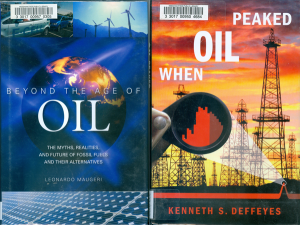Two authors, with very different styles, approaches and opinions, write books about oil and our energy future. Reading them together, it is easy to imagine a provocative and enlightening panel with the two authors. But the real takeaway are the points on which they both come to very similar conclusions.
Kenneth Deffeyes, the author of When Oil Peaked, is a petroleum geologist and emeritus professor of geology at Princeton who began his career in research at Shell. You can imagine his being entertaining in the classroom, as he writes in a breezy style, seeming almost to toss out ideas as they occur to him.
Leonardo Maugeri, the author of Beyond the Age of Oil, is the senior executive vice president of strategies and development for Italian oil and gas giant Eni SpA. His approach is more methodical, more based on the business numbers involved in energy.
The two authors bring very different perspectives on key issues:
- Deffeyes is a strong supporter of the peak oil hypothesis, having also written the book “Hubbard’s Peak”. Maugeri argues that there is not a shortage of recoverable fossil fuels.
- Deffeyes thinks of the climate change movement as wanting to take us back to pre-industrial society. Maugeri sees climate change as a defining moral challenge for our society.
- Both men view climate change itself as a real problem. Deffeyes approaches it as an engineering problem with an engineering solution (not necessarily geo-engineering). Maugeri is concerned about the societal shift required before the problem can be truly tackled.
There are other differences along the way as the authors proceed through their analysis of all the alternative sources of energy. And not surprisingly, their specific recommendations on how to reach our energy future also differ.
So what is worth noting is the strong convergence from both authors on several conclusions:
- We must move away from fossil fuels.
- Energy from the sun is the potentially limitless energy resource. Tapping it successfully, though, will take perhaps 50 years.
- Renewables today are a very small part of the solution, though growing rapidly.
- Coal, gas and nuclear will therefore be major energy sources for many years. We must make the tough choices of how much of each we will use and how to mitigate the problems they cause.
- The low price of fossil fuels (along with the volatility) is a significant barrier to progress.
Of the two books, I found Maugeri’s Beyond the Age of Oil more satisfying because it was more information-rich and more reflective about the author’s opinions and biases. But both are well worth reading, and I highly recommend reading them together to get the most out of both books.

